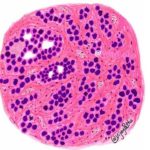Myelopoiesis
What is hematopoiesis? It is the process of production of blood cells from hematopoietic stem cells which then differentiate to yield rbcs, wbcs and platelets. It all starts with hematopoietic stem
Read MoreBenign prostatic hyperplasia(BPH) / Nodular hyperplasia of prostate
Benign prostatic hyperplasia(BPH) / Nodular hyperplasia of prostate Introduction: BPH or benign prostatic hypertrophy or Nodular hyperplasia of prostate is a condition characterised by the enlargement
Read MorePathology of Renal Oncocytoma
Renal Oncocytoma is a benign tumour. It accounts for 5 to 15% of all resected renal tumours. It arises from the cells of collecting ducts. It occurs commonly in adults and shows male predominance.
Read MorePathology of Schwannoma
Schwannomas are benign neurogenic tumors that exhibit Schwann cell differentiation.Also known as Neurilemmoma They are commonly associated with inactivating mutations of the NF2 gene and loss of the
Read MorePathology of Acute pyelonephritis
Acute pyelonephritis Acute pyelonephritis is defined as suppurative inflammation of kidney and renal pelvis Caused by bacterial infection_ most commonly gram negative bacilli- E Coli. Recurrent
Read MoreSonic Hedgehog pathway
Sonic Hedgehog pathway Sonic Hedgehog pathway is one of the complex signal transduction mechanism that controls or governs the process of cellular development. The Hedgehog signaling pathway plays a
Read MorePathology of Medullary Carcinoma- Breast
Pathology of Medullary Carcinoma- Breast New terminology: " Invasive breast carcinoma- not special type(IBC-NST) with medullary pattern" IBC-NST with medullary pattern (Medullary carcinoma) appears
Read MorePathology of Infiltrating duct carcinoma- Breast
Pathology of Infiltrating duct carcinoma(No special type) Infiltrating duct carcinoma/ invasive duct carcinoma of No Special type is the most common type of breast carcinoma. Ductal carcinoma in situ
Read More







